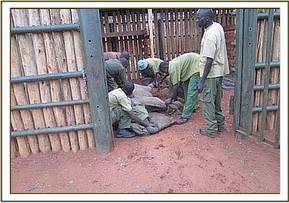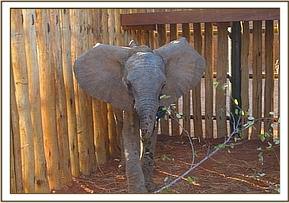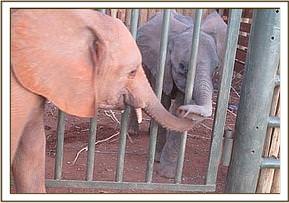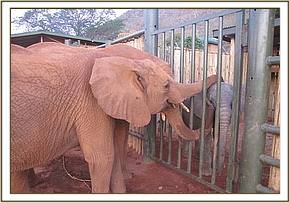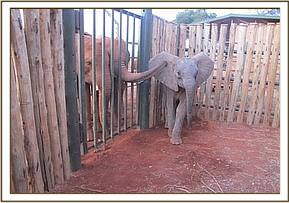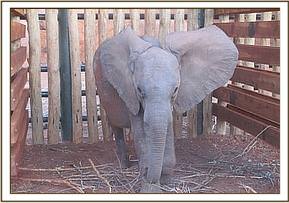

Has fully embraced her wild life in Tsavo East National Park
Current age
16 years old
Gender
Female
Rescued date
9 October 2009
Rescue location
Tsavo Ecosystem, Galana Ranch
Date of birth (estimate)
10 October 2009
Reason orphaned
Poaching
Age at rescue
0 weeks old (approx)
Current location
Living Wild
With the poachers now earning as much as a US$100 a kilo from the Middle Men, when just a couple of years ago the price was US$10 a kilo. If Africa’s elephants are to be saved the demand for ivory has to be eliminated within its far eastern destinations, and only will a total ban on the sale of all ivory and ivory products, whether legal or illegal, will stem the slaughter. Impoverished communities living alongside National Parks cannot resist temptation of this nature. And so Emsaya’s mother more than likely met this fate, killed so that her tusks could be calved into a decorative ornament, or hanko. If it were not for the people that spotted her, and reported her fate, and for both the KWS and Sheldrick Wildlife Trust teams that helped save her, she too would have been the ivory demand’s collateral damage. Poaching ravages elephant society. It is never just the poached elephant, but the dependent young that die too, and the whole herd is torn apart and irreplaceable wisdom lost as matriarchs fall, those with the understanding and vital knowledge of how to guide their families through the harsh dry seasons that grip this area almost annually, with the knowledge of where vital water sources lie, where safe migratory passages are, all that crucial wisdom goes with them. The beautiful big breeding bulls whose guidance and discipline is so vital for the younger male generations growing up in their wake, their demise is immeasurable too.
Little Emsaya as she was called, had obviously been without her family for awhile for she was gaunt and thin, aged approximately two years old, alone and vulnerable. The rescue team arrived in the afternoon, and was immediately shown to the Galana River’s banks to where the young calf was browsing. Rescuing a calf this size, even when thin and weak, is not a job for the faint hearted and it took brave men to chase into the bush after her to do so. Eventually she was restrained, her legs strapped and she was lifted into the Trust’s pickup vehicle. It was decided by both Angela and Daphne that she would be taken to the Sheldrick Wildlife Trust’s Voi stockades, to join little Kivuko rescued just a few days before, as both calves are just over two years old. Although both still milk dependent, remaining in Tsavo with our Voi adolescent orphans seemed like a good option, and after a two hour drive she was safely delivered to the taming stockades there.
It took a number of days before she tamed down, and for her to get used to the milk, but with the loving attention of both the Keepers and the older orphans, she began to understand very quickly the routine and that not all people were the enemy. Emsaya did not arrive into our care quite as weak as Kivuko had a few days previously, and so regained her strength quickly. She and Kivuko are now very much part of the Voi orphans group, and follow the Keepers and older orphans trustingly. United in their loss they are forming a very special relationship with Lesanju, Lempaute, Sinya, Kenia, Wasessa, infact all the females that make up the Voi unit making a fuss of them too, so they very much have the balm of love once more back in their lives.
With the poachers now earning as much as a US$100 a kilo from the Middle Men, when just a couple of years ago the price was US$10 a kilo. If Africa’s elephants are to be saved the demand for ivory has to be eliminated within its far eastern destinations, and only will a total ban on the sale of all ivory and ivory products, whether legal or illegal, will stem the slaughter. Impoverished communities living alongside National Parks cannot resist temptation of this nature. And so Emsaya’s mother more than likely met this fate, killed so that her tusks could be calved into a decorative ornament, or hanko. If it were not for the people that spotted her, and reported her fate, and for both the KWS and Sheldrick Wildlife Trust teams that helped save her, she too would have been the ivory demand’s collateral damage. Poaching ravages elephant society. It is never just the poached elephant, but the dependent young that die too, and the whole herd is torn apart and irreplaceable wisdom lost as matriarchs fall, those with the understanding and vital knowledge of how to guide their families through the harsh dry seasons that grip this area almost annually, with the knowledge of where vital water sources lie, where safe migratory passages are, all that crucial wisdom goes with them. The beautiful big breeding bulls whose guidance and discipline is so vital for the younger male generations growing up in their wake, their demise is immeasurable too.

View diary updates from across all our orphan units as written by the Keepers

After huge thunderstorms on the evening of Saturday the 6th April, Tsavo woke up to the chatter of bird song and beautifully fresh smelling air
By adopting, you play a vital role in the life of an orphaned elephant, rhino, or giraffe — helping us provide the round-the-clock, loving attention each one needs and deserves over many years, so they can ultimately reclaim their place in the wild.
Your adoption supports the 100+ orphans in our care at any given time, covering the cost of milk and food supplies, Keepers' salaries, veterinary treatment, and other essentials.

Celebrate your adoption with a personalised certificate, ready for you or your lucky gift recipient to print and display!

Each month, we send a detailed update about our Orphans’ Project direct to your email inbox, featuring photos, stories, and special highlights.

From the latest Keepers’ Diaries to a downloadable image gallery and more, adopters have exclusive access to our content library.
